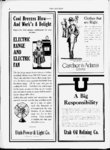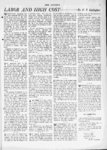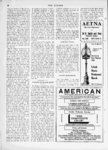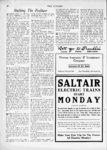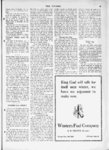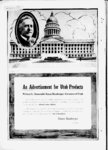| OCR Text |
Show - THE t CITIZEN LABOR AND HIGH COST-a decadent people. X7 ORKINGMEN sometimes com.-plain hopelessly that It Is to get ahead of the high cost of living, even though wages ine crease. Costs, they say, always wages. It 1b easy to understand why this is so when we find what proportion of the cost of any article is ascribable to labor. Labor, for example, will abosrb $27 of the pro-ductlon cost of a suit that sells for Im-possib- le out-rac- ISO or. $32.50. The way out, however, is not so difficult as the complalners imagine and is implied in a statement made by William Higginbotham, an English (.investigator, who is in the United States collecting data in connection with the establishment in England of an association for the advancement of education in industry and commerce. Capitalists in England, he says, are not generally against trade unions, and many believe them necessary, but they wish to convince the workers that trade can be carried on only by the efficiency of their members In securing intensive production without fatigue. . . . While the Germans were working industriously, making every moment count in intensive production, the British workmen had acquired the Bolshevist habit before Bolshevism was exploited. By a very simple process they were sapping the foundations of British industry. Germany and England were- great business concerns. Germany was producing up to the limit of capacity; England was soldiering. The radical British workmen in the trades unions and these unions are much more radical than our own -i- nclined to the Bolshevik theory of production for use and not for In Russia that theory has profit had its chance and the result has been that production has fallen below not only the profit standard, but the use standard. The spectacle is presented of production below both profit and use. - England the process INslow because the of decay was theory was not carried to its ultimate limits as in Russia. Lenine and Trotskys purpose was to destroy the industrial system and build anew. They wanted the . is, that suggestion here should toil a reasonable number of hours at their highest capacity. If all workers did that prices would fall. Education is necessary to . convince workers of the truth of this doctrine. In England, shortrsighted agitators have tried to convince the workers that the less work a man does the more work there will be for others. The fallacy lies in the fact that this limits production and the mass of wealth is kept down to a minimum. The policy for every nation should be maximum production in these times when the worlds stock of wealth has been depleted. The majority of workmen in London, and for that matter in most of England, says Mr. Higginbotham, believe in the policy of one job serving two men when it ought to serve only one. It is hard to get the British workman to drop his ca canny policy, for he believes that by it his interests are best served, prompted by the idea that capital is his enemy. .This felse doctrine has resulted in the astounding fact that wages are lower in England than in any other THE country. The big strides made by Germany before the war in many lines English-speakin- g England formerly held the lead are blamed more to this attitude of the workman than to any unusual skill or diligence of Teutonic workin which men and manufacturers. Germany laid down goods in England cheaper than we could make them, although previously we had shipped the same A rticles to all parts of the world. a few words, INtells us what is Mr. Higginbotham the matter with England. The process of decline began long ago and gave the Germans the impression that the English were work of destruction to be as quick and thorough as possible so that the working class could possess itself of all the means of production and distribution-all of the machinery. They wanted to destroy the entire wage system. The English did not know just what they wanted. Some wanted to destroy the wage system, but most of them did not carry their theory that far. They wished to retain capital and wages that is to say, the present industrial system but they thought that they could further their own ends best by making one job do for two men.' They did not see that intensive production would tend to raise wages and at the same time hold down costs of production thus holding down the costs of living. Admittedly it is more difficult latter theory today, than it would have been before the war. So many unusual circumstances have arisen as the result of war that the proposition is not so capable of Living costs clear demonstration. have been affected by these unusual circumstances to such an extent that the whole question has become confusing not merely to the average citizen but even to the experts. It would be more or less idle, therefore, to burden this commentary with figures and data on the relation between wages and living costs. Mr. Higginbotham has placed his finger on the wound that is crippling industry in England. At the same time he has suggested the cure. English workman had a of enmity toward the industrial changes since the riots of a century ago when the machines and factories were destroyed. Of recent years this THE By F. P. Gallagher has prevented the installation of the most machinery. And, en passant, it may be well to remark that the same causes and effects were to be noted in our own country, though to a lesser degree. The British workman did not see the utility of working the best machinery to its topmost capacity. On the contrary he had the pernicious idea that if he but limited the output of the machine he would provide work for more men. The manufacturer did not install all the latest models because the workmen would limit the output to the level of the old models. It was a narrow outlook and yet it seemed as clear as two and two. The error lay in the British workmans failure to take into consideration the entire mass of production. Perhaps the matter can be made more lucid by considering certain conditions in our own country at the present. During the war new industries were established in the United States notably the shipping and dye industries. At this very time, despite the ending of the war, there is a shortage of labor because of the additional production. The crisis is apt to be intensified in the next decade if our labor supply is held down by restrictup-to-da- te workman should give the best that is in him for good wages. Generally speaking, however, Mr. Gompers is correct. The American workingman, as a matter of fact, never was wedded to the sabotage system. He was the best paid worker in the world because he was the best worker. When the foreigner came to our industries he immediately began to show more speed. He could not compete without coming up to the American . ' level of efficiency. 'THE possibility of reducing I- costs by efficiency of labor is illustrated by an example which Br. Higginbotham cites. He says that in America, with wages much higher, an automobile could be produced for $500 less than the same car could be turned out in England with its low wages. The American theory, in the main, has been that the greatest possible production is the most advantageous to all. We have not feared that business would come to a jump off place. We have argued that business would continue to expand indefinitely and the results have seemed to confirm our. view. If we but consider the number of extensive industries today that did not ed immigration. The working of machinery to its ut- exist even in imagination a century most capacity has not had the effect ago we shall get a truer idea of what of throwing men out of work. There business expansion means. Millions of men are employed on steam railways, always has been new work to do. New business will be established with in the telephone and telegraph busithe labor released by the labor saving ness, in the automobile industry, in electric light and power industries and machine. in many other industries which have to the original point, been developed within the last hundred COMING back note that the way to make years. increased wages count for something beyond a mere living is to reduce the living costs can be WHETHER costs of production. And how may the old level is another this be done when increased wages question. It is hardly to be expected tend to increase the cost of produc- that prices will soon drop to the pretion? By increased efficiency of war level if they ever do. Wages, war both man and machinery. By givtaxes and many other elements will ing better labor for better pay not tend to fix a new price level, but it necessarily more hours of labor, but still remains true that wages can be more skillful and conscientious labor. made to count for more if labor adopts That will help reduce the cost of liv- the plan of intensive production. The ing. tendency will be to cheapen the cost The workman must rid himself of of the article produced and to reduce the idea that the more work the in- the price to the consumer. It is cerdividual does the less work there will tain that if we were to adopt the thebe for the other fellow. There is no ory of the British radical the cost of limit to production except the capaci- living would go still higher and wages ty of the world to pay for the produc- would count for less and less. tion. The business of the world will grow in the next generation so that THE LESSER EVIL. what we call "big business now will appear trivial by contrast. There will The matrimonial problem presented always be jobs unless production is itself to a young lady who had reached limited by destructive theories. a marriageable age. Jeanie, said her father, its a tells us that solemn Higginbotham MR. thing to get married. Gompers gave the BritI ken that, father, said the senish workingmen a hard jolt when he a great deal told them that the toilers of the sible lass;' but its to be single. United States had discarded the ca canny plan. Unfortunately the plan Trotzky is Red, has not. been discarded by all of the William is blue, workers in the United States. Too Were you in his fix many of the younger generation on Youd be, too. the other hand, have discarded the Boston Transcript loyal doctrine of their fathers that a -- . sol-emn- er s |

